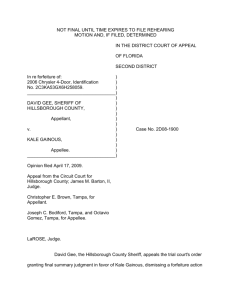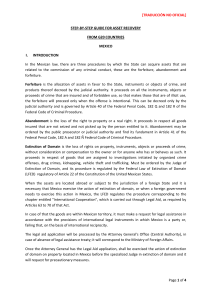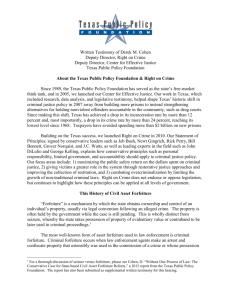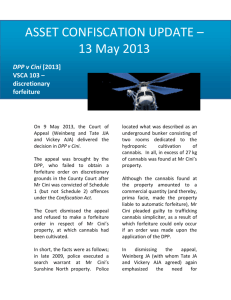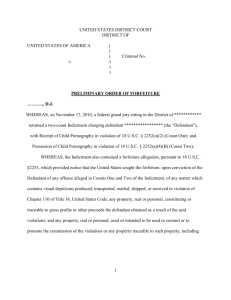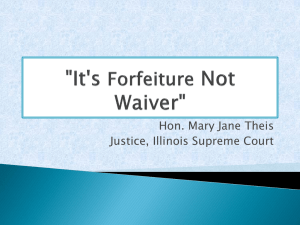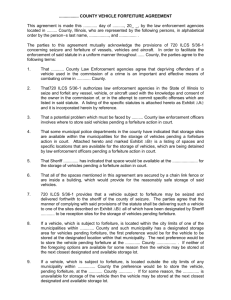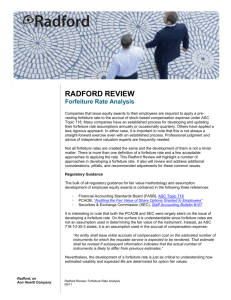civil asset forfeiture
advertisement
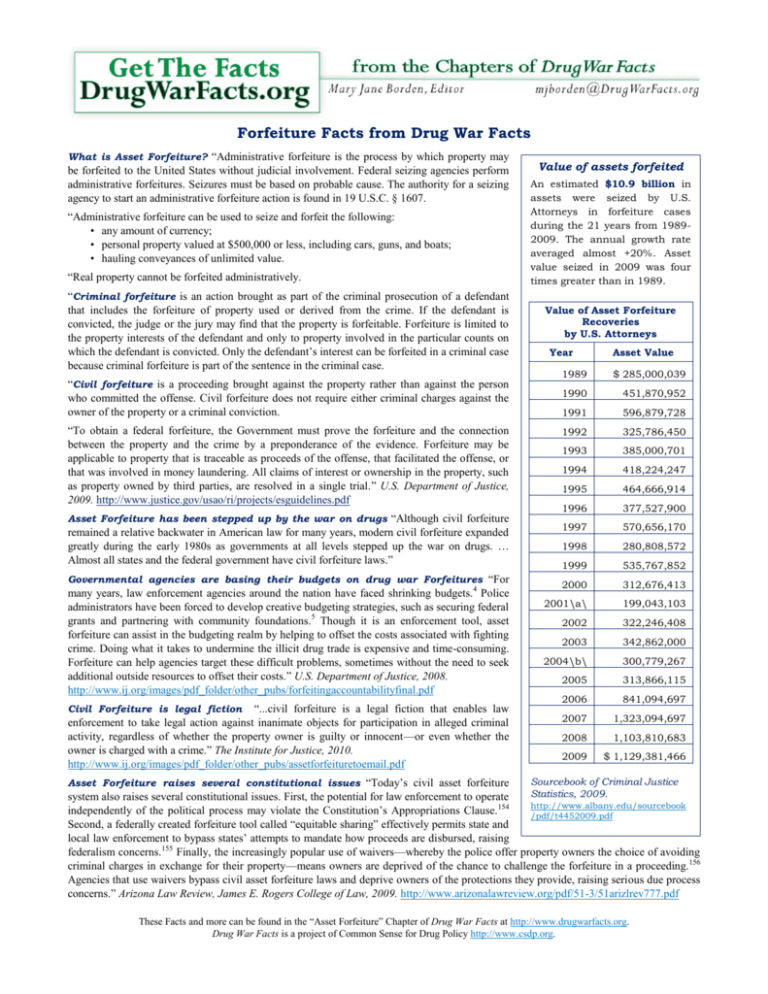
Forfeiture Facts from Drug War Facts What is Asset Forfeiture? “Administrative forfeiture is the process by which property may be forfeited to the United States without judicial involvement. Federal seizing agencies perform administrative forfeitures. Seizures must be based on probable cause. The authority for a seizing agency to start an administrative forfeiture action is found in 19 U.S.C. § 1607. “Administrative forfeiture can be used to seize and forfeit the following: • any amount of currency; • personal property valued at $500,000 or less, including cars, guns, and boats; • hauling conveyances of unlimited value. “Real property cannot be forfeited administratively. “Criminal forfeiture is an action brought as part of the criminal prosecution of a defendant that includes the forfeiture of property used or derived from the crime. If the defendant is convicted, the judge or the jury may find that the property is forfeitable. Forfeiture is limited to the property interests of the defendant and only to property involved in the particular counts on which the defendant is convicted. Only the defendant’s interest can be forfeited in a criminal case because criminal forfeiture is part of the sentence in the criminal case. “Civil forfeiture is a proceeding brought against the property rather than against the person who committed the offense. Civil forfeiture does not require either criminal charges against the owner of the property or a criminal conviction. “To obtain a federal forfeiture, the Government must prove the forfeiture and the connection between the property and the crime by a preponderance of the evidence. Forfeiture may be applicable to property that is traceable as proceeds of the offense, that facilitated the offense, or that was involved in money laundering. All claims of interest or ownership in the property, such as property owned by third parties, are resolved in a single trial.” U.S. Department of Justice, 2009. http://www.justice.gov/usao/ri/projects/esguidelines.pdf Asset Forfeiture has been stepped up by the war on drugs “Although civil forfeiture remained a relative backwater in American law for many years, modern civil forfeiture expanded greatly during the early 1980s as governments at all levels stepped up the war on drugs. … Almost all states and the federal government have civil forfeiture laws.” Governmental agencies are basing their budgets on drug war Forfeitures “For many years, law enforcement agencies around the nation have faced shrinking budgets.4 Police administrators have been forced to develop creative budgeting strategies, such as securing federal grants and partnering with community foundations.5 Though it is an enforcement tool, asset forfeiture can assist in the budgeting realm by helping to offset the costs associated with fighting crime. Doing what it takes to undermine the illicit drug trade is expensive and time-consuming. Forfeiture can help agencies target these difficult problems, sometimes without the need to seek additional outside resources to offset their costs.” U.S. Department of Justice, 2008. http://www.ij.org/images/pdf_folder/other_pubs/forfeitingaccountabilityfinal.pdf “...civil forfeiture is a legal fiction that enables law enforcement to take legal action against inanimate objects for participation in alleged criminal activity, regardless of whether the property owner is guilty or innocent—or even whether the owner is charged with a crime.” The Institute for Justice, 2010. http://www.ij.org/images/pdf_folder/other_pubs/assetforfeituretoemail.pdf Civil Forfeiture is legal fiction Asset Forfeiture raises several constitutional issues “Today’s civil asset forfeiture Value of assets forfeited An estimated $10.9 billion in assets were seized by U.S. Attorneys in forfeiture cases during the 21 years from 19892009. The annual growth rate averaged almost +20%. Asset value seized in 2009 was four times greater than in 1989. Value of Asset Forfeiture Recoveries by U.S. Attorneys Year Asset Value 1989 $ 285,000,039 1990 451,870,952 1991 596,879,728 1992 325,786,450 1993 385,000,701 1994 418,224,247 1995 464,666,914 1996 377,527,900 1997 570,656,170 1998 280,808,572 1999 535,767,852 2000 312,676,413 2001\a\ 199,043,103 2002 322,246,408 2003 342,862,000 2004\b\ 300,779,267 2005 313,866,115 2006 841,094,697 2007 1,323,094,697 2008 1,103,810,683 2009 $ 1,129,381,466 Sourcebook of Criminal Justice Statistics, 2009. system also raises several constitutional issues. First, the potential for law enforcement to operate http://www.albany.edu/sourcebook 154 independently of the political process may violate the Constitution’s Appropriations Clause. /pdf/t4452009.pdf Second, a federally created forfeiture tool called “equitable sharing” effectively permits state and local law enforcement to bypass states’ attempts to mandate how proceeds are disbursed, raising federalism concerns.155 Finally, the increasingly popular use of waivers—whereby the police offer property owners the choice of avoiding criminal charges in exchange for their property—means owners are deprived of the chance to challenge the forfeiture in a proceeding.156 Agencies that use waivers bypass civil asset forfeiture laws and deprive owners of the protections they provide, raising serious due process concerns.” Arizona Law Review, James E. Rogers College of Law, 2009. http://www.arizonalawreview.org/pdf/51-3/51arizlrev777.pdf These Facts and more can be found in the “Asset Forfeiture” Chapter of Drug War Facts at http://www.drugwarfacts.org. Drug War Facts is a project of Common Sense for Drug Policy http://www.csdp.org.

